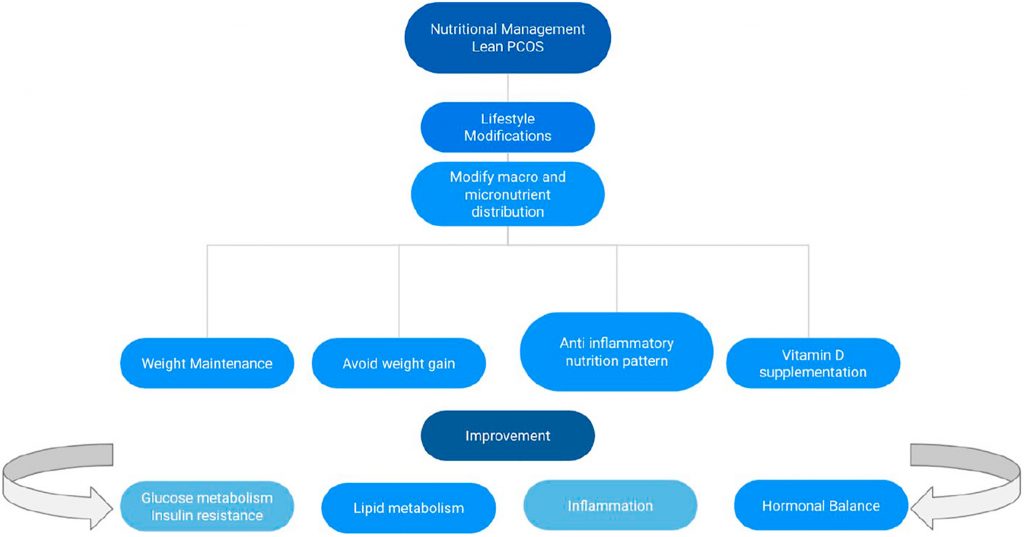PCOS or polycystic ovarian syndrome is an endocrine/metabolic disorder that affects 10-15% of the world population. Since it is primarily a metabolic disorder, regulating the patient’s nutrition is crucial in managing the symptoms.
A formal diagnosis for PCOS occurs when the patient ticks off one or more of the following symptoms:
- Oligo or anovulation
- Signs of hyperandrogenism
- Polycystic ovaries
Also, the diagnosis should rule out the possibilities of other diseases like congenital adrenal hyperplasias, androgen-secreting tumors, or Cushing’s syndrome.
Although the researchers and medical professionals are still skeptical about the mechanism of development of this disease, the primary findings suggest a strong correlation between obesity, insulin resistance, hyperinsulinemia, low-grade inflammatory factors, etc.
These contributing factors further contribute to chronic complications like Type-2 Diabetes, metabolic syndrome, infertility, cardiovascular diseases, etc.
The primary objective of this review is to highlight that PCOS isn’t subjective to obese women only. It affects lean women as well. A comprehensive study by Satyaraddi et al. shows that obese and extremely lean women have higher risks of visceral adiposity and are metabolically worse than the control group in question.
Eating habits, thus, were found to have a crucial impact on the development and progression of PCOS in women. Weight management with a balanced and nutritious dietary habit is key to managing PCOS in women, especially in obese women who account for 25-70% of the PCOS patients.
A study from Faghfoori et al. suggests that a dietary treatment targeted towards managing insulin resistance and metabolic functions is key to PCOS management. So, consumption of whole foods, foods with a low glycemic index (GI), is considered ideal. Also, the patient needs to take care of additional deficiencies like Vitamin D, chromium, and omega-3 fatty acids.
Nutritional Approach to Lean and Obese PCOS Patients
PCOS is considered and notably the most common form of endocrinopathy in females during their fertility age. Although the pathogenesis of this condition is still unclear, doctors have found that genetic predisposition plays a very crucial role in PCOS etiology.
Although PCOS is indeed prevalent in obese women, it is also true that the condition is insightful in lean women. Lean patients with a BMI score of less than 25 kg/sq.m struggle with the condition too.
Nutrition is one of the universal modifiable factors that help prevent and treat several non-communicable diseases, including PCOS. Although exercising and dietary modifications are a coupled treatment route for obese patients with PCOS, the same isn’t applicable for lean patients.
Here’s a quick breakdown of the nutritional approach individually for lean and obese patients.
| Nutritional Approach for PCOS | |
| Lean Patients | Obese Patients |
| Consume a healthier diet in composition with more fruits and vegetables for an optimal supply of vitamins and minerals. | Mediterranean and ketogenic diets are considered optimal for obese PCOS patients to lose weight faster. |
| Include modified macronutrient composition in the diet. | The use of inositol has proven benefits in weight loss. |
| Follow Mediterranean dietary patterns for coping with low-grade inflammation in the body, along with insulin resistance and hyperandrogenemia. | Exercising for optimal hormone balance and weight loss results. |
| Reduced consumption of dairy, red meat, processed meats, sweets. | Low-saturated fat weight loss diet. |
| Following these dietary interventions preserve skeletal mass, reduce inflammation and oxidative stress in the body. | Vitamin-D supplementation improves gut health and reproductive functions. |
| Consume medicinal herbs that support hormone balance. | Cyclohexane-1,2,3,4,5,6-hexol (Inositol) belongs to the vitamin B complex macronutrient inclusion in the diet has been found to have promising benefits for the patients. |
Conclusion
Even though the prevalence of PCOS is more in obese patients, the same isn’t restricted to just obese patients. Instead, the review suggests that the metabolic condition affects lean women equally. The review found that irrespective of the adiposity levels and the androgen concentrations in the body, the patients suffering from PCOS had higher serum insulin levels, leading to insulin resistance.
While the 5-10% weight loss is the first line of PCOS treatment in obese patients, lean patients should maintain their current body weight. Backing the treatment with a healthy dietary pattern with optimal macronutrient distribution is ideal for this condition.
As for the nutritional approach, several types of diets, including low saturated-fat diet, ketogenic diet, Mediterranean diets, and low carb diets, have been found beneficial in regulating this condition.
Besides dietary changes, obese patients who have undergone bariatric surgeries have experienced significant improvements to their androgen levels in the body. This helped regulate menstrual cycles and heightened the chances of fertility.
References:
1- Luigi Barrea, Evelyn Frias-Toral, Ludovica Verde, Florencia Ceriani, Gabriela Cucalón, Eloisa Garcia-Velasquez, Dino Moretti, Silvia Savastano, Annamaria Colao, Giovanna Muscogiuri, PCOS and nutritional approaches: Differences between lean and obese phenotype, Metabolism Open, Volume 12, 2021, 100123, ISSN 2589-9368, https://doi.org/10.1016/j.metop.2021.100123. (https://www.sciencedirect.com/science/article/pii/S2589936821000475)
This content has been reviewed by Srujana Mohanty who is working in scientific & medical writing and editing since 2018. She is also associated with the quality assurance team of scientific journal editing.




